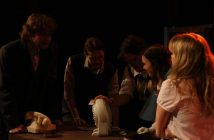Captivating, disturbing and yet riotously funny, POSH is a play that has the audience fluctuating between uproarious laughter and stunned silence as it mocks the hedonism of the upper classes whilst also carrying a serious political undertone.
Following its pre-election debut in 2010, Laura Wade’s satirical play has seen numerous adaptations and somewhat mixed reviews. The play focuses upon The Riot Club, a fictional reproduction of Oxford University’s notorious Bullingdon Club. It fairly transparently challenges the Tory high-command’s privileged backgrounds and three big names: David Cameron, George Osborne and Boris Johnson. All of whom famously attended the club in their younger and less publicly-scrutinised years.
Having previously witnessed this play performed by a different company and also seen the very recent 2014 film adaptation The Riot Club, it is safe to say that Theatre Group’s performance not only lived up to my expectations, but surpassed them. Director Caitlin Hobbs’ claim that she “couldn’t have asked for a stronger cast with which to bring the show to life” has certainly been validated.
 In terms of the laughs, particular praise must go to Alex Batty, playing Guy Bellingfield (or ‘Bell-end’). As a newcomer to Theatre Group, Batty is a relentlessly funny presence on stage and arguably the highlight of the first half. Both the opening scene he performs with MP Jeremy, or ‘Uncle Jezza’ (Peter Ward), and his hilarious robot-dance-style entrance to The Riot Club dinner are unforgettable moments. Batty gives a completely uninhibited performance as the audience follows his character’s cringe-worthy, desperate and often backfiring attempts to become the club’s new president.
In terms of the laughs, particular praise must go to Alex Batty, playing Guy Bellingfield (or ‘Bell-end’). As a newcomer to Theatre Group, Batty is a relentlessly funny presence on stage and arguably the highlight of the first half. Both the opening scene he performs with MP Jeremy, or ‘Uncle Jezza’ (Peter Ward), and his hilarious robot-dance-style entrance to The Riot Club dinner are unforgettable moments. Batty gives a completely uninhibited performance as the audience follows his character’s cringe-worthy, desperate and often backfiring attempts to become the club’s new president.
Another particularly noticeable performer is Andy Banks, playing George Balfour. Again one of the characters not to be taken too seriously, Banks nails his drunken harmlessness with almost Captain Jack Sparrow-like inebriation. Breaking the tension of many a hard-to-take scene in the second half with such charming interjections as asking whether anyone plans not to finish their pudding, for example, is a joy to watch.
While it was indeed entertaining to witness the antics of these obnoxious posh boys, the core meaning of the play is exposed largely by the character of Alastair Ryle, played by Alex Scotchbrook. A character who passes fairly unnoticed through the earlier parts of the play, Scotchbrook brings Alastair into the spotlight with the first of his many passionately bitter speeches, closing the first half with his statement that he is “sick to death of poor people”. Scotchbrook’s execution is highly engaging; his few stumbled lines towards the end of the second half can be easily overlooked thanks to his otherwise captivating performance, reducing a previously laughing audience to silence with his shocking and well-delivered proclamations of hate for the working and lower middle classes.
The play’s setting and general practicalities are also well-accomplished. The only disappointment in terms of props is the dining clubs’ main course, supposedly a ten bird roast. It must have been fairly difficult for the cast to react with such awe to what was, in fact, a pretty average-looking Sunday dinner. However, this was the single moment which perhaps requires a little imagination; the rest of the set and costume lives up to expectation. The use of the dining room painting defiled with the word ‘RIOT’ in graffiti, in particular, is intelligently used. As Alistair discovers he won’t be reprimanded for assaulting the landlord, the painting is lit up while the lights go down, leaving the audience with a bitter reminder of the injustice of the Old Boys’ network.
POSH will be performed at the Annex Theatre at 7.30pm until 1st of November. Tickets can be reserved at theatre.susu.org/posh.



